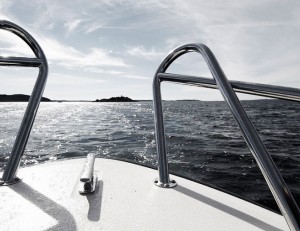Mandatory boater education is required for anyone born on or after September 1, 1993 to operate a PWC or motorboat with a motor greater than 15 hp.
There are more than 600,000 registered boats in Texas, ranking it 6th in the country.
Texas has more square miles of inland water than any other state.
Recreational boating safety is a primary area of responsibility of Texas game wardens.
The most common water safety citations are issued are for:
- Not having enough lifejackets on board the boat.
- Children younger than 13 not wearing a life jacket.
All children younger than age 13 must wear a life jacket while in a boat less than 26 feet in length that is underway.
Game Wardens and Marine Safety Enforcement Officers enforce the Boating While Intoxicated (BWI) law. A person who either appears to be impaired and/or has a blood alcohol level of 0.08 or higher while operating a boat can be arrested for BWI.
A person arrested for BWI may be jailed for up to 180 days, be fined as much as $2,000 or both. Additionally, the person’s drivers’ license may be automatically suspended.
Nearly 85% of boating fatality drowning victims were not wearing a life jacket.
Boating Safety Tips:
- Always wear a life jacket.
- Avoid alcohol.
- Be especially careful on personal watercrafts.
- Children younger than age 13 must wear a U.S. Coast Guard approved PFD while underway.
- Enroll in a boater education class.
- Don’t overload your boat.
- Operate at a safe speed.
- Always have a passenger serve as a lookout in addition to the operator.
- Watch out for low water areas or submerged objects.
- Watch the weather
Checking the weather before you leave for a day of boating is important but it will not prevent weather problems. At many times of the year and in different areas of the country, the weather can change rapidly, and even professionals have trouble predicting these changes. Weather changes generally come from the west. While underway, you should continue to check the weather. If you have a marine radio you can get weather reports on 162.55 MHz or 162.40 MHz, or from local Coast Guard radio stations. If you have a portable radio, tune to a station that gives frequent weather updates.
Flat clouds (or stratus — little vertical development) are normally associated with stable air. Puffy clouds (or cumulus – considerable vertical development) indicate unstable air. The greater the vertical development of the cloud, the greater the instability. Thunderstorm clouds have the greatest vertical development and the associated weather is quite violent.
If you are caught in foul weather:
- Reduce speed. Proceed with caution. Put on PFD.
- Head for nearest shore that is safe to approach.
- Head bow into waves at about a 40 degree angle.
- Secure loose items. Have emergency gear ready.
- Keep bilges free of water.
- Seat passengers on bottom of boat near center line.
- If your engine fails anchor the boat.
Follow Us: Facebook – Foursquare – Twitter – YouTube – LinkedIn
“Boater Education.” TPWD: Know Your Weather Signs. Web. 04 June 2012.

